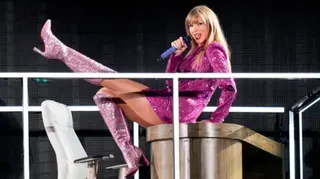
Aug 13
A Guide to Taylor Swift's Most Elaborate Album Announcements
Maria Sherman READ TIME: 4 MIN.
NEW YORK (AP) — Taylor Swift doesn't simply announce albums. She curates events.
That's a trend that certainly did not begin with the announcement of her 12th studio album, “The Life of a Showgirl, ” on Tuesday.
She's long embraced new technologies and forward-thinking marketing opportunities that allow her to connect directly with fans. (Who could forget her third studio album, 2010's “Speak Now,” was announced via the now-defunct Ustream? Or that 2012's “Red” was announced via Google+ Hangout — RIP — while over 70,000 fans watched via YouTube stream? Just us?)
As her profile has risen, so too have her efforts. Easter eggs abound in her album rollouts. Here are a few of her most memorable.
“Reputation” (2017)
ANNOUNCEMENT DATE: Aug. 23, 2017
HOW SHE DID IT: “Reputation” arrived with much speculation — at the time, the once very public-facing Swift had begun to keep a low profile, heightening the mystery. A week before Swift announced the album — which arrived on the three-year anniversary of the announcement of her last album, 2014’s “1989” — Swift deleted every post across her social media platforms. A few days later, she posted a 10-second video clip of a snake. Soon afterward, she revealed the name of her album, its release date, and the fact that the first single from the project would arrive the very next day.
RELEASE DATE: Nov. 10, 2017
“Folklore” (2020)
ANNOUNCEMENT DATE: July 23, 2020
HOW SHE DID IT: In the midst of the coronavirus pandemic, Swift got creative. She announced that her eighth album, “Folklore,” would arrive the next day — less than a year after the release of her seventh, “Lover.”
“Most of the things I had planned this summer didn’t end up happening, but there is something I hadn’t planned on that DID happen. And that thing is my 8th studio album, folklore. Surprise,” she wrote on Instagram at the time. “I’ve poured all of my whims, dreams, fears, and musings into. I wrote and recorded this music in isolation.”
It wasn’t just the album announcement that was a surprise. “Folklore” marked a sonic detour for the pop star.
RELEASE DATE: July 24, 2020
“Evermore” (2020)
ANNOUNCEMENT DATE: Dec. 10, 2020
HOW SHE DID IT: A few months after the surprise release of “Folklore,” the prolific Swift announced “Evermore.” She called it a “sister” to “Folklore.”
“To put it plainly, we just couldn’t stop writing songs,” Swift wrote on social media in December. “I’ve never done this before. In the past I’ve always treated albums as one-off eras and moved onto planning the next one after an album was released.”
RELEASE DATE: Dec. 11, 2020
“Midnights” (2022)
ANNOUNCEMENT DATE: Aug. 28, 2022
HOW SHE DID IT: Swift took home the top prize at the 2022 MTV Video Music Awards before she closed out the show with a big announcement: a new album.
“I thought it would be a fun moment to tell you that my new album comes out Oct. 21,” said Swift. after she won video of the year for her project “All Too Well: The Short Film,” which claimed best long-form video and direction. “I will tell you more at midnight.”
At the anointed hour, Swift said on social media that her 10th studio album would be called “Midnights,” which she said would involve “stories of 13 sleepless nights scattered throughout my life.”
RELEASE DATE: Oct. 21, 2022
“1989 (Taylor’s Version)” (2023)
ANNOUNCEMENT DATE: Aug. 9, 2023
HOW SHE DID IT: Taylor Swift closed the 2023 U.S. leg of her landmark Eras Tour in Los Angeles in a big way, announcing the fourth edition of her re-recording project: “1989 (Taylor’s Version).”
“Instead of just, like, telling you about it, I think I’ll just sort of show you,” she told the crowd as the screen illuminated behind her. “’1989 (Taylor’s Version)’ available Oct. 27!” she cheered, pointing out that she was revealing this on the eighth month of the year and the ninth day — a numerical clue.
Then she launched into a surprise performance of the ascendant “1989” track “New Romantics” and the “Reputation”-era piano ballad “New Year’s Day” for the first time during her world tour.
RELEASE DATE: Oct. 27, 2023
“The Tortured Poets Department” (2024)
ANNOUNCEMENT DATE: Feb. 4, 2024
HOW SHE DID IT: The night of the Grammys, Swift provoked mass speculation when her site seemed to go down. Some theorized she was gearing up to release “Reputation (Taylor’s Version),” but cryptic clues on the “crashed” site indicated that might be a misdirect. In classic Swift fashion, it was. While accepting the Grammy for best pop vocal album, Swift said she’d been keeping a secret for two years: “The Tortured Poets Department,” an all-original album.
RELEASE DATE: April 19, 2024
“The Life of a Showgirl” (2025)
ANNOUNCEMENT DATE: Aug. 12, 2025
HOW SHE DID IT: For her 12th studio album, Swift really embraced the number. She announced the album on her website shortly after a countdown timer expired at 12:12 a.m. on Aug. 12.
The day before, the Taylor Nation account — an official branch of her marketing team — posted a TikTok slideshow of 12 images captioned “Thinking about when she said ‘See you next era…’” That was posted 12 minutes after an image of a mysterious silhouette appeared on the social media accounts for the “New Heights” podcast hosted by Swift’s boyfriend, Kansas City Chiefs tight end Travis Kelce, and his brother, former Philadelphia Eagles center Jason Kelce. Fans theorized the outline was of Swift. They were, of course, correct.
The “New Heights” social media accounts confirmed Swift would appear on the podcast for the first time. That appearance was scheduled for Aug. 13 — 13, of course, another number important to Swift.
RELEASE DATE: It remains to be seen.






